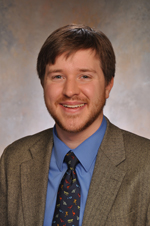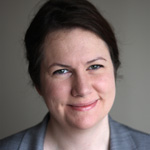 The Christine Mirzayan Science & Technology Policy Graduate Fellowship Program has provided fellows with a 12-week immersive science policy experience for 20 years. Based within the National Academies in Washington DC, Mirzayan alumni are now found throughout the science policy realm in the United States and abroad.
The Christine Mirzayan Science & Technology Policy Graduate Fellowship Program has provided fellows with a 12-week immersive science policy experience for 20 years. Based within the National Academies in Washington DC, Mirzayan alumni are now found throughout the science policy realm in the United States and abroad.
We spoke to Ben Krinsky, PhD, a 2015 Mirzayan alum, about his experiences as a fellow and how they helped him in his current position at the Federation of American Societies for Experimental Biology(FASEB), of which GSA is a member society.
Q: What is your title and role at FASEB?
I am the Senior Legislative Affairs Officer. One of my primary responsibilities is to be an advocate for basic research and biomedical science, which means trying to persuade Congress to increase funding for basic life sciences research. I am a registered lobbyist, although week-to-week I don’t spend a huge amount of time directly lobbying lawmakers. Most of my time is spent on background work coming up with talking points, gathering information and developing arguments in favor of science funding. As an organization, FASEB is very focused on the NIH, although my efforts focus other parts of the federal government such as the NSF, the Department of Agriculture, and the Department of Energy Office of Science.
Q: How do you feel the Christine Mirzayan Science and Technology fellowship opportunity differed from other programs?
Unlike the many year-long fellowships, it only lasts three months, and so it is, in essence, a crash course in science policy. Another major difference is that fellows specifically work at The National Academies, which provide the government with scientific advice and expertise. The National Academies were chartered as an independent organization but have very close ties to federal agencies and Congress, So, while the Academies resemble think-tanks, they have a unique and long-standing role in Washington.
Q: What was a typical day like as a Mirzayan fellow?
As a fellow, you’re paired with a mentor who is a staff member for one of the Academies’ boards or committees. While you work on the Academies’ ongoing projects fulltime, the fellowship program organizes a series of its own activities. For example, roughly once a week, all the fellows would get together to hear a speaker from an outside organization, or participate in journal clubs about science policy issues. The day-to-day experience is specified more by ongoing projects, but that being said, I was given a fair amount of leeway to explore aspects of my project that were of interest to me. In addition, fellows are encouraged to explore Washington as much as possible. There is flexibility to leavethe office and attend events such as congressional committee hearings, professional networking functions or informational interviews with people in Washington. That is especially important if you’re looking to stay in DC after the fellowship.
Q: How did you interact with stakeholders as a Mirzayan fellow?
The Academies brings in outside experts to serve on boards and committees to produce recommendations in particular policy areas. They also bring people together for workshops and other activities. As a Mirzayan fellow, I interacted with both academic and industry members of the Committee on Science, Engineering, Medicine, and Public Policy. I also interacted with people who had been brought in specifically to work on a report about postdoctoral fellows. Through my mentor’s professional network, I also met with people who worked for non-government or non-profit organizations. It was through networking events that I met someone at FASEB, which was how I obtained my current position.
Q: How did your expectations compare to your actual experience?
I wasn’t quite sure what to expect. Though it was very different from what I was doing as a grad student, it turns out that what we say about transferable skills is true. You can bring a lot of the experience and knowledge you gain in grad school and apply it in different contexts. I had an amazing and gratifying experience. I think the Mirzayan fellowship gave me insights into how the Academies work, and also a better sense of all the different kinds of organizations that work on science policy issues. It was really enlightening.
Q: What professional skills did you gain from your fellowship?
Like a lot of organizations, the Academies are driven by elaborate internal policies. It’s a large bureaucracy, and you need to be able to manage people, boards, and committees. I’ve found that fellowship experience very useful here at FASEB, where we have a similar policy process; if we want to put out a statement or a letter, it has to go through one or more committees, be approved by our board, and so forth. In general, the policy world is made up of a lot of small tasks on different timescales. For example, if we want to get the word to Congress before they vote on a bill, that might happen in a matter of days or hours. Other things are longer term. At the Academies, it might be convening a committee to write a report that takes six months or a year. At FASEB, it might be crafting materials for an advocacy campaign over weeks or months. It’s different from your thesis, which has an overarching focus. Instead, you have a panoply of different things to keep track of. These are skills I fleshed out at the Academies and that have been very helpful in my current job.
Q: What advice would you give to prospective applicants on how to prepare an application to the Mirzayan fellowship program?
My impression is that they aren’t necessarily looking for people who have extensive policy experience. I think that’s because the fellowship is designed to be a learning opportunity. You’re not supposed to show up and know everything about policy. I had done a couple of small things as a grad student that leaned towards policy, for instance volunteering as a student representative to a GSA public policy committee and participating in a Capitol Hill day visit. I think it really helped just to express the idea that this was something I wanted to engage in further.
Q: What motivated your decision to do a science policy fellowship?
Midway through grad school, I started thinking that I didn’t want to continue on a traditional research career. It’s not that I wanted to totally get away from science. I still loved science, but I was getting interested in politics. Towards the end of grad school, I started thinking more concretely about getting into policy. A science fellowship is one stepping-stone that is commonly used these days to get your foot in the door in Washington. That being said, I worry sometimes that the path is being too tightly circumscribed. I’d say that before the proliferation of fellowships, scientists could just be hired directly into federal agency or nonprofit work. While my impression is that doing fellowships is becoming much more common, it’s important not to see there being just a single path. There are lots of ways to be engaged in this world.
This post is part of the Early Career Scientist Policy Subcommittee’s series on science policy fellowships.
About the author:
 Lacy Barton is a member of the Early Career Scientist Policy Subcommittee and a postdoctoral fellow at New York University’s Skirball Institute of Biomolecular Medicine. Lacy’s goals are to give back to the GSA community that has been instrumental in her scientific training and to support our common interest in sustainable, inclusive, and rigorous basic research.
Lacy Barton is a member of the Early Career Scientist Policy Subcommittee and a postdoctoral fellow at New York University’s Skirball Institute of Biomolecular Medicine. Lacy’s goals are to give back to the GSA community that has been instrumental in her scientific training and to support our common interest in sustainable, inclusive, and rigorous basic research.













